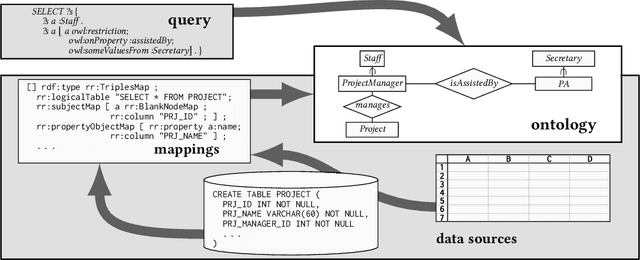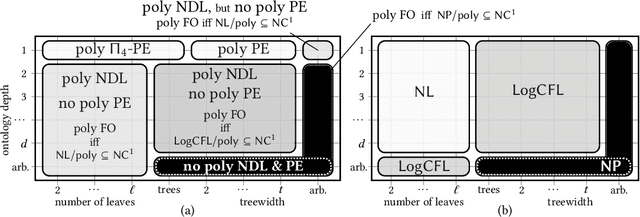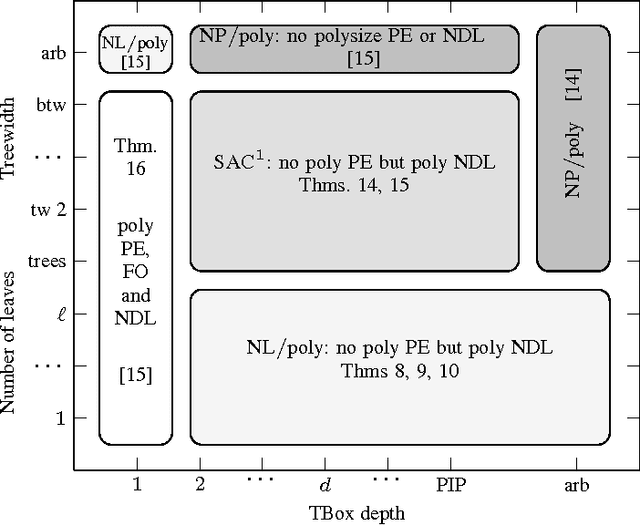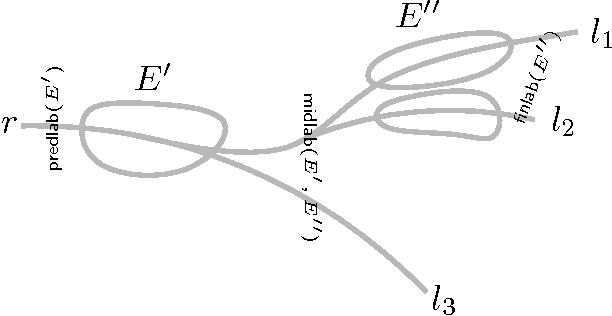Stanislav Kikot
Spatial Intelligence of a Self-driving Car and Rule-Based Decision Making
Aug 02, 2023



Abstract:In this paper we show how rule-based decision making can be combined with traditional motion planning techniques to achieve human-like behavior of a self-driving vehicle in complex traffic situations. We give and discuss examples of decision rules in autonomous driving. We draw on these examples to illustrate that developing techniques for spatial awareness of robots is an exciting activity which deserves more attention from spatial reasoning community that it had received so far.
A data complexity and rewritability tetrachotomy of ontology-mediated queries with a covering axiom
Jun 07, 2020



Abstract:Aiming to understand the data complexity of answering conjunctive queries mediated by an axiom stating that a class is covered by the union of two other classes, we show that deciding their first-order rewritability is PSpace-hard and obtain a number of sufficient conditions for membership in AC0, L, NL, and P. Our main result is a complete syntactic AC0//NL/P/coNP tetrachotomy of path queries under the assumption that the covering classes are disjoint.
Ontology-Mediated Queries: Combined Complexity and Succinctness of Rewritings via Circuit Complexity
May 04, 2016



Abstract:We give solutions to two fundamental computational problems in ontology-based data access with the W3C standard ontology language OWL 2 QL: the succinctness problem for first-order rewritings of ontology-mediated queries (OMQs), and the complexity problem for OMQ answering. We classify OMQs according to the shape of their conjunctive queries (treewidth, the number of leaves) and the existential depth of their ontologies. For each of these classes, we determine the combined complexity of OMQ answering, and whether all OMQs in the class have polynomial-size first-order, positive existential, and nonrecursive datalog rewritings. We obtain the succinctness results using hypergraph programs, a new computational model for Boolean functions, which makes it possible to connect the size of OMQ rewritings and circuit complexity.
Tree-like Queries in OWL 2 QL: Succinctness and Complexity Results
May 13, 2015

Abstract:This paper investigates the impact of query topology on the difficulty of answering conjunctive queries in the presence of OWL 2 QL ontologies. Our first contribution is to clarify the worst-case size of positive existential (PE), non-recursive Datalog (NDL), and first-order (FO) rewritings for various classes of tree-like conjunctive queries, ranging from linear queries to bounded treewidth queries. Perhaps our most surprising result is a superpolynomial lower bound on the size of PE-rewritings that holds already for linear queries and ontologies of depth 2. More positively, we show that polynomial-size NDL-rewritings always exist for tree-shaped queries with a bounded number of leaves (and arbitrary ontologies), and for bounded treewidth queries paired with bounded depth ontologies. For FO-rewritings, we equate the existence of polysize rewritings with well-known problems in Boolean circuit complexity. As our second contribution, we analyze the computational complexity of query answering and establish tractability results (either NL- or LOGCFL-completeness) for a range of query-ontology pairs. Combining our new results with those from the literature yields a complete picture of the succinctness and complexity landscapes for the considered classes of queries and ontologies.
 Add to Chrome
Add to Chrome Add to Firefox
Add to Firefox Add to Edge
Add to Edge